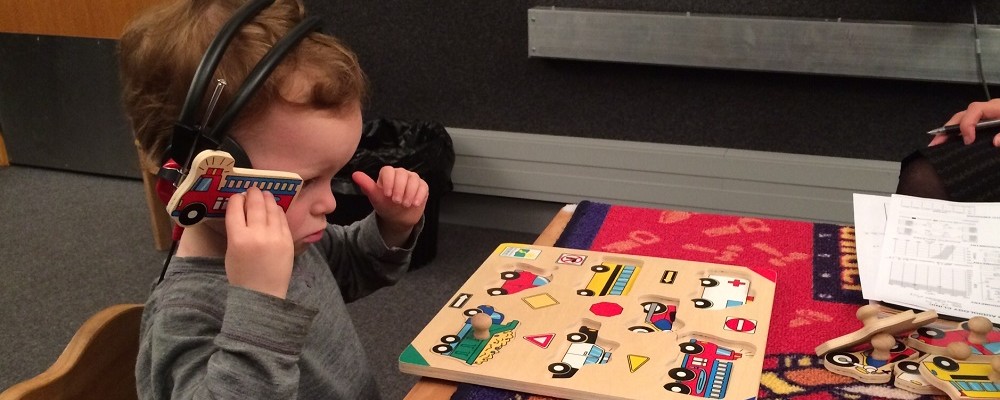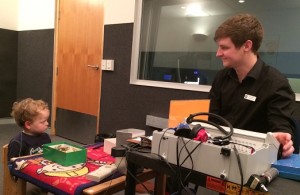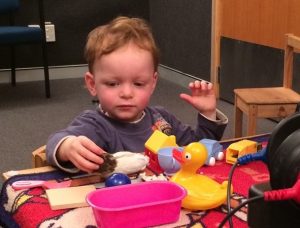Children and Hearing Loss

Hearing loss in children, whether short term or long term, may have a big effect on speech development, language and therefore learning. To learn to speak for the first time we must be able to hear all of the parts of the word to understand meaning and reproduce the sounds. Hearing loss disrupts the learning process for speech.
This link will take to a "Hearing Health Check" for children and adults on the New Zealand Audiological Society (NZAS) website
Hearing services for children in New Zealand
Children in New Zealand are screened for hearing loss soon after birth, in the new born hearing screening program, usually while they are still in hospital. Children who do not pass the screening assessments are referred to Audiologists for a full assessment.
Children who are found to have permanent hearing loss are fitted with hearing aids or cochlear implants as soon as possible to give them the best chance of developing speech and language. Most of the assessment and habilitation for young children is done for free within the hospital system.

Types of hearing loss

Sensori-neural hearing loss occurs due a problem in the inner ear (cochlear) or in the higher auditory pathways. Usually this type of hearing loss is permanent.
Conductive hearing loss occurs when the sound is blocked from getting to the inner ear. This type of heairng loss could be temporary or permanent.
Auditory process in disorder (APD) occurs in the higher sound processing area of the brain. Children with APD have normal peripheral hearing.
Conductive hearing loss - Glue Ear

Otitis media is an accumulation of fluid in the middle ear. This fluid stops the ear drum and the small middle ear bone from moving freely and therefore causes a conductive hearing loss (resistance of sound) moving through the middle ear space.
Accute Otitis Media - is often painful and last around 3 weeks before resolving its self.
Chronic Otitis Media - means fluid remains in the middle ear space over a long period of time. Some children may not experience (or show pain).
Fluid that remains for a longer period or time becomes more viscous and "gluey"...
...hence the name glue ear.
Glue ear causes a significant hearing loss and if not resolved does effect the development of speech and there for language and learning.
Testing middle ear function

Immittance Audimetry or middle ear testing involves putting a small plug into the ear and increasing the pressure slightly. This measures whether the ear drum is moving and therefore whether is fluid in the middle ear space.
If there is fluid, then the ear drum will not move. This test also picks up if there is a hole in the ear drum or a patent (working) grommet. This is a quick accurate and painless test for both children and adults.
Testing children's hearing
Automatic testing - Auditory brainstem response testing is used for babies up to a few months old. While the baby sleeps a clicking sound is played through headphones and electrodes that have been placed on the babies head measure electrical brain signals. This test becomes more difficult as chilren get older as they must be asleep for the test.
Visual reinforcement Audiometry - Is a behavioural test and can be dome from when the baby sit on the care givers knee and can turn their head (a few months old). A sound is played to one side of the child, when they turn their head toward it a puppet is showed to them in the window.
Play Audiometry - is used for children of about 3 to 6 years old. They listen to sounds through head phones than put a peg in a board or a similar game.
Older children - will do a hearing test in a simlar way to adults by pressing a button or tapping when they hear a sound.




Auditory Processing Disorder
Auditory Processing Disorder (APD) is a hearing problem which occurs not in the ears but in the hearing pathways or hearing centres of the brain. The ears may process sound normally, and the person may pass ordinary hearing tests, but the brain has difficulty interpreting what is heard. This type of hearing loss adversely affects understanding, especially in difficult listening situations such as when there is other distracting sound present, or when listening to complex information or instructions. As a result learning is usually affected.
Definition from the SoundSkills Website
SoundSkills is a centre based in Greenlane Auckland that specialises in the assessment and habitation of APD. If you are concerned that your child may have APD we will do the initial hearing assessment here at Auckland hearing and then refer you on to SoundSkills (other Audiologist the specials in APD).

Services for children at Auckland Hearing
- Middle ear function testing for all age groups
- Hearing assessments for children for 4 years or older
- Initial audiograms for children suspected to have an auditory processing disorder (APD)




